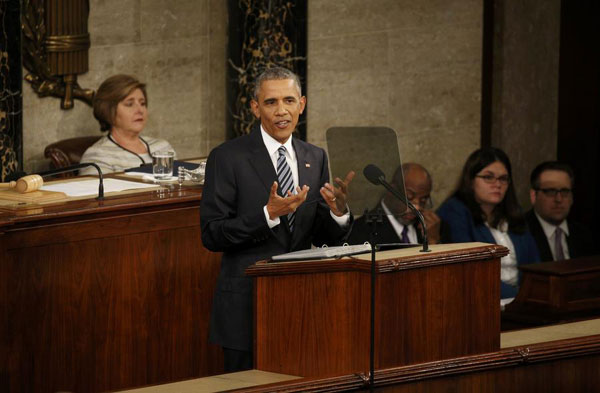Obama's legacy and its implications for China
By Zhang Zhixin (China Daily) Updated: 2016-01-30 08:17
 |
|
US President Barack Obama delivers his State of the Union address to a joint session of Congress in Washington, January 12, 2016. [Photo/Agencies] |
US President Barack Obama delivered his last State of the Union address on Jan 12, set out what he considered would be his legacy after he leaves the White House. Obama's legacy will not only have profound impact to the coming 2016 presidential and congressional elections, but also have huge influences on US-China relations.
There is no doubt that his first and the most important legacy will be the recovery of the US economy after the worst recession since the Great Depression. As the US is still one of the engines for the global economy, the positive effect of its recovery on the rest of the world has been obvious.
In 2010, the US Congress passed the Dodd-Frank Wall Street Reform and Consumer Protection Act, which brought the most significant changes to financial regulation in the US since the regulatory reform that followed the Great Depression, something that has helped the US transform its economy from imports and consumption oriented toward exports and savings oriented.
Another significant legislative achievement was The Affordable Care Act, which was also passed that year. This removed the US from the list of industrialized countries that do not provide universal healthcare to their citizens.
Although there was no legislation on climate change, Obama still used his executive power to limit carbon dioxide emissions and promote green energy sectors. According to the White House, since Obama took office, the US has increased its solar energy generation twentyfold and tripled the amount of electricity produced by wind generation.
In 2012, US greenhouse gas emissions fell to their lowest level in nearly 20 years, and last year at the Paris talks an ambitious global agreement to combat climate change was secured, which will establish a long term, durable global framework to reduce global greenhouse gas emissions.
- China, US find more to agree on
- China, US in regular contact on major issues
- China-US nonstops easing connections
- No sign of letup in nonstop flights between China, US
- China, US have potential to develop new type cyber relations
- Maintaining cyber security is a common interest to China, US - US expert
- China-US cyber dialogue 'important' to advance bilateral ties
- Positive intent can cement China-US ties

I’ve lived in China for quite a considerable time including my graduate school years, travelled and worked in a few cities and still choose my destination taking into consideration the density of smog or PM2.5 particulate matter in the region.











